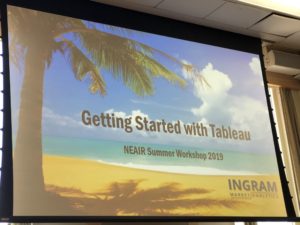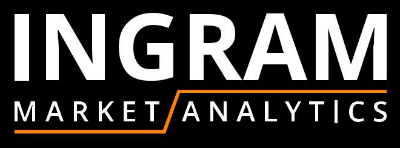Continuing with my summer vacation of training, here’s the scoop on my training session on Tableau and my work with the IPEDS Data Institute.
Tackling Tableau
My first workshop at NEAIR was about Getting Started with Tableau – which has become the go-to tool to visualize and share your results, quickly and easily, with clear, compelling graphs and charts. Some of the attendees were Tableau beginners, while others were eager to understand the benefits before they buy it.
One new Tableau feature lets users develop their own learning library. You can start by making a video of yourself using the basic Tableau features so the lessons get “baked in.”
Of course, I showed them how to use the Tableau Public website to find other viz (visualizations) to adopt as features in their own viz.. I call this R & D, which in this case, stands for Rip off and Duplicate!
One handy tip for Tableau is: Don’t start from scratch with an unfamiliar database. Learn strategically, by using work you already created in MS Excel and convert it to Tableau. It is an easier way to get over the learning curve and be assured the data you are displaying for the first time in Tableau is accurate.
If you are considering purchasing Tableau but need a better understanding of what it can do for you, give me a call. I also offer customized training to teams to help you get more out of Tableau.
The effect of student loan debt
Amid all the training, I also was one of 30 researchers nationwide to participate in the NCES Data Institute. The research group started in March and met formally in June and studied how the financial burdens of student-loan debt affect graduates involvement in civic activities. Basically, we asked, “Does the social benefit of a college education reduce how graduates does interest in working public-service jobs, volunteering, or voting when it is accompanied by debt?”
We learned that:
- Women and African Americans were more likely to work in the public or non-profit sector.
- People working in the public or non-profit sectors were more likely to volunteer.
- African Americans and public sector employees were more likely to vote.
- Undergraduate academic major was a significant predictor of employment sector (for profit or non-profit) i.e., students with a business major were less likely to participate in public or non-profit sector employment than other majors (e.g., humanities).
- Academic major had limited, and mixed relationships with voting behaviors and was not a significant predictor of volunteering.
Through the research, we found that demographics and behavioral characteristics, not student loan debt, are the strongest predictors of civic engagement for a selected cohort of baccalaureate degree holders. The good news, is that loan debt is not a factor that keeps people from participating in civic activities.
Know your acronyms
| IPEDS – Integrated Postsecondary Education Data System |
| AIR – Association for Institutional Research |
| NCES – National Center for Education Statistics |
| SFA – Student Financial Aid |
| NEAIR – North East Association of Institutional Research |
| TAIR – Texas Association for Institutional Research |

